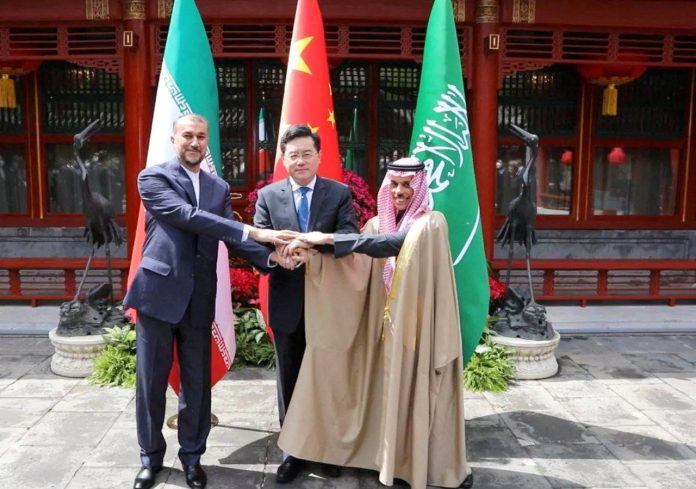BEIJING, China (Caasimada Online) – In a historic diplomatic breakthrough, the foreign ministers of Iran and Saudi Arabia met in Beijing on Thursday, pledging to work together towards regional “security and stability.”
The meeting followed a surprise China-brokered agreement announced in March, which aimed to restore relations between the two Middle Eastern rivals after a seven-year rift.
Iranian Foreign Minister Hossein Amir-Abdollahian and his Saudi counterpart, Prince Faisal bin Farhan, released a joint statement after their discussions.
They emphasized the importance of implementing the Beijing Agreement to build mutual trust, expand cooperation, and create regional security, stability, and prosperity.
The agreement, brokered in March, marked the first step towards restoring relations between Tehran and Riyadh, which were severed in 2016 after Iranian protesters attacked Saudi diplomatic missions.
A new era of cooperation
The Iranian foreign ministry said that the two sides had “negotiated and exchanged opinions with the emphasis on the official resumption of bilateral relations and the executive steps towards the reopening of the embassies and consulates of the two countries.”
Under last month’s agreement, both countries will reopen their embassies and missions within two months and implement security and economic cooperation deals signed over 20 years ago.
The rapprochement between predominantly Sunni Muslim Saudi Arabia and Shiite-majority Iran, which has long been at odds with Western governments over its nuclear activities, could significantly alter relations across the region.
Both nations have supported rival factions in several conflict zones, including Yemen, Syria, Lebanon, and Iraq.
Their reconciliation could pave the way for potential peace talks and conflict resolution in these areas.
China’s diplomatic success
China’s active mediation in bringing the two Middle Eastern rivals together marks a significant challenge to the United States’ long standing role as the primary outside power broker in the region.
Joel Rubin, former US Deputy Assistant Secretary of State for Legislative Affairs, told AFP that Beijing’s role could boost confidence in the agreement’s longevity.
He noted, “Because China is a strong backer of Iran, Saudi should have more confidence in Iran’s ability to comply with the agreement.”
Ali Vaez, Director of the International Crisis Group’s Iran Project, said Thursday’s meeting “suggests that the process hasn’t gone off track since the Beijing announcement last month.”
However, he added that whether this development is a tactical détente or a step toward a more strategic rapprochement remains to be seen.
Restoring diplomatic ties
Iran and Saudi Arabia held several rounds of talks in Baghdad and Oman before their historic meeting in Beijing.
Their agreement has set a precedent for other Gulf countries to restore diplomatic relations with Tehran.
Last year, Iran received an Emirati ambassador after a six-year absence, and Iran recently named its own ambassador to the United Arab Emirates.
Kuwait also sent its first ambassador to Tehran since 2016. Iran has expressed openness to rapprochement with Bahrain, a close Saudi ally.
With diplomatic channels reopening and the potential for a new era of cooperation between Iran and Saudi Arabia, the future of the Middle East may be marked by increased security, stability, and prosperity.


